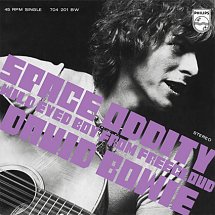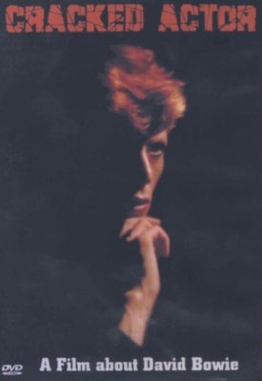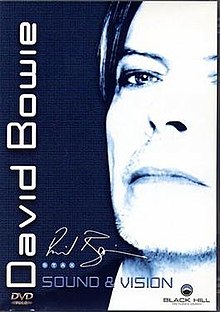
David Robert Jones, known professionally as David Bowie, was an English singer, songwriter, musician and actor. Regarded as one of the most influential musicians of the 20th century, Bowie was acclaimed by critics and musicians, particularly for his innovative work during the 1970s. His career was marked by reinvention and visual presentation, and his music and stagecraft has had a significant impact on popular music.

Reality is the twenty-fourth studio album by the English musician David Bowie, originally released in Europe on 15 September 2003, and the following day in America. His second release through his own ISO label, the album was recorded between January and May 2003 at Looking Glass Studios in New York City, with production by Bowie and longtime collaborator Tony Visconti. Most of the musicians consisted of his then-touring band. Bowie envisioned the album as a set of songs that could be played live.

"Space Oddity" is a song by the English singer-songwriter David Bowie. It was first released on 11 July 1969 by Philips and Mercury Records as a 7-inch single, then as the opening track of his second studio album, David Bowie. Produced by Gus Dudgeon and recorded at Trident Studios in London, it is a tale about a fictional astronaut named Major Tom; its title and subject matter were partly inspired by 2001: A Space Odyssey (1968) and Bowie's feelings of alienation at that point in his career. Its sound departed from the music hall of his debut album to psychedelic folk inspired by the Bee Gees; it was one of the most musically complex compositions he had written up to that point.

Heathen is the twenty-third studio album by the English musician David Bowie, originally released in Europe on 10 June 2002, and the following day in America. His first release through his own ISO label, it reunited Bowie with the producer Tony Visconti for the two's first full-album collaboration since 1980. Recording took place at New York studios from August 2001 to January 2002 and featured guest musicians including Dave Grohl and Pete Townshend. Two tracks, "Afraid" and "Slip Away", evolved from Bowie's shelved Toy project, while three were covers of songs by Pixies, Neil Young and the Legendary Stardust Cowboy.

Cracked Actor is a 1975 television documentary film about the musician David Bowie, made by Alan Yentob for the BBC's Omnibus strand. It was first shown on BBC1 on 26 January 1975.

"John, I'm Only Dancing" is a song by the English musician David Bowie, originally released as a non-album single on 1 September 1972. It is a glam rock and R&B song with lyrics that describe a situation in which the narrator informs his lover not to worry about the girl he is with because he is "only dancing" with her. Although ambiguous, many commentators interpreted it as concerning a gay relationship. Recorded in London in June 1972, it was promoted with a low-budget promotional video directed by Mick Rock. It reached number 12 in the UK; RCA refused to release it in America due to its suggestive lyrical content.

David Live is the first official live album by the English musician David Bowie, originally released through RCA Records in October 1974. The album was recorded in July of that year, on the initial leg of Bowie's Diamond Dogs Tour, at the Tower Theater in Upper Darby Township, Pennsylvania.

"Moonage Daydream" is a song by the English singer-songwriter David Bowie. It was originally recorded in February 1971 at Radio Luxembourg's studios in London and released as a single by his short-lived band Arnold Corns in May 1971 on B&C Records. Bowie subsequently re-recorded the song later that year with his backing band the Spiders from Mars—Mick Ronson, Trevor Bolder and Mick Woodmansey—for release on his 1972 album The Rise and Fall of Ziggy Stardust and the Spiders from Mars. The re-recording was co-produced by Ken Scott and recorded at Trident Studios in London in November 1971. The re-recording is a glam rock song that uses melodic and harmonic hooks, as well as percussion and guitar influenced by heavy metal. On the album, the song directly introduces the character Ziggy Stardust, who describes himself as a bisexual alien rock superstar who will save the Earth from the impending disaster described in the opening track "Five Years". It features saxophone played by Bowie and a guitar solo and string arrangement by Ronson.

David Bowie (1947–2016) held leading roles in several feature films, including The Man Who Fell to Earth (1976), Just a Gigolo (1978), Merry Christmas, Mr. Lawrence (1983), The Hunger (1983), Labyrinth (1986), The Linguini Incident (1991), and Twin Peaks: Fire Walk with Me (1992). Films in which he appeared in a supporting role or cameo include The Last Temptation of Christ (1988) and Zoolander (2001).
"Cracked Actor" is a song by the English musician David Bowie, released on his sixth studio album Aladdin Sane (1973). The track was also issued as a single in Eastern Europe by RCA Records in June that year. The song was written during Bowie's stay in Los Angeles during the American leg of the Ziggy Stardust Tour in October 1972. Co-produced by Bowie and Ken Scott, it was recorded in January 1973 at Trident Studios in London with his backing band the Spiders from Mars – comprising Mick Ronson, Trevor Bolder and Woody Woodmansey. A hard rock song primarily led by guitar, the song describes an aging Hollywood star's encounter with a prostitute, featuring many allusions to sex and drugs.
"Right" is a song by the English musician David Bowie from his album Young Americans, released on 7 March 1975. Recorded on 14–18 August and 20–24 November 1974 at Sigma Sound Studios in Philadelphia, "Right" is the last of four tracks on side one of Young Americans, and the B-side of the single "Fame", released in August 1975.

"Hallo Spaceboy" is a song by the English musician David Bowie from his 20th studio album, Outside (1995). It originated as an instrumental by Reeves Gabrels called "Moondust", which Bowie and Brian Eno stripped down and used to form the final track. An industrial rock and electronica number influenced by the Pixies and Nine Inch Nails, the song contains a hypnotic sound, with synthesisers, loops and distorted guitar lines. Lyrically influenced by Brion Gysin, the song contains images of apocalypse and continues the androgynous conundrums of former Bowie songs such as "Rebel Rebel".

"Survive" is a song by the English musician David Bowie from his 1999 album Hours. It was later released in remixed form as the album's third single on 17 January 2000, reaching number 28 in the UK. Written by Bowie and Reeves Gabrels, it is a reflective number detailing the end of a relationship. Musically, it recalls the sound of Bowie's folk rock music of the late 1960s, and 1971's Hunky Dory. Its music video echoes the reflective quality of the recording, portraying Bowie levitating at a kitchen table with an egg. Critics and biographers praised "Survive" as a highlight of Hours. Bowie performed the song frequently throughout 1999 and 2000.

Scott Walker: 30 Century Man is a 2006 documentary film about Scott Walker. The film gets its title from the Scott 3 song "30 Century Man". It is directed and co-produced by Stephen Kijak, with Grant Gee serving as director of photography. It charts Walker's career in music, with a focus on his songwriting, and features exclusive footage of recording sessions for his most recent album, The Drift including a memorable sequence in which Walker oversees the recording of the punching of a joint of pork, for the percussion on the song Clara. Rock legend David Bowie, who often professed to having been inspired by Walker, acted as executive producer of the film. Actor Gale Harold is one of the associate producers.
Nicholas Pegg is a British actor, director and writer.

A Reality Tour was a worldwide concert tour by the English singer-songwriter David Bowie in support of his 2003 album Reality. The tour began on 7 October 2003 at the Forum Copenhagen, Denmark, continuing through Europe, North America, Asia, including a return to New Zealand and Australia for the first time since the 1987 Glass Spider Tour. At over 110 shows, the tour was the longest tour of Bowie's career. A heart attack in late June 2004 forced the cancellation of some dates near the end of the tour. Bowie retired from performing live in 2006, making this tour his last.

Glass Spider is a concert film by English singer David Bowie. The release was sourced from eight shows during the first two weeks of November 1987 at the Sydney Entertainment Centre in Australia during the last month of the Glass Spider Tour. The 86-show tour, which also visited Europe, North America and New Zealand, was in support of Bowie's album Never Let Me Down (1987). Originally released in 1988 on VHS, the tour was choreographed by Toni Basil, directed by David Mallet, and produced by Anthony Eaton. The VHS was released by MPI Home Video in the US and by Video Collection International in the UK.

Ricochet is a 1984 documentary film about the musician David Bowie. Made with Bowie’s full consent and participation, it was the second of such documentary productions following Cracked Actor from 1975. However, whereas Cracked Actor was made for television by the BBC's Omnibus strand, Ricochet was made for commercial release to the home video market.

David Bowie: Black Tie White Noise is a 1993 film accompanying the release of the David Bowie album of the same name. The primary purpose of the film was to remove the need of a tour to promote the album. It was directed by long time Bowie collaborator David Mallet, and was originally released in 1993 on VHS.

The videography of English singer-songwriter and actor David Bowie (1947–2016). This page gives an overview of his music video singles, music video films and compilations, live music films and music documentaries.
















